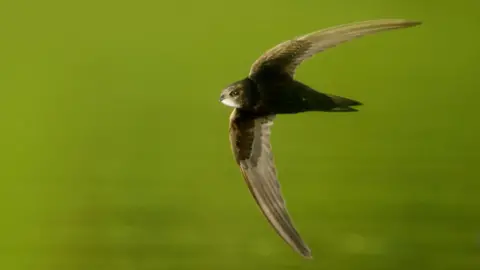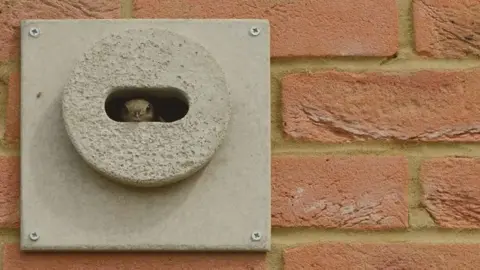Move to install 'swift bricks' in new Rushcliffe homes
 RSPB
RSPBA council has pledged to make at least 50% of homes on new developments include "swift bricks".
Rushcliffe Borough Council said installing the bricks, which have small holes in, would encourage the endangered bird to nest in new communities.
The bricks are designed to allow small birds to access a space to nest.
Deputy council leader Abby Brennan said the move "has the potential to halt the decline of swifts".
The decision will now be attached to all relevant planning permissions for new buildings granted in Rushcliffe under laws that support the environment.
Councillors also supported a requirement for new commercial and industrial developments to have a minimum of three swift bricks installed per unit.
The council is now reviewing where the bricks can be added to its own existing buildings.
 RSPB
RSPBAccording to the Royal Society for the Protection of Birds (RSPB), the numbers of swifts in the UK fell by 62% between 1995 and 2021.
Ms Brennan said due to declining insects, modern farming methods, and loss of habitat and suitable nesting sites, there has been a serious impact on their numbers in recent decades, meaning they are now on the RSPB "red list" of threatened species.
She added: "Including swift bricks in the design of new buildings has the potential to halt the decline of swifts in our borough, while also providing a safe nesting place for many other types of small birds, in a permanent, discrete and maintenance-free way."
The RSPB said swifts liked to live in houses and churches, squeezing through tiny gaps to nest inside roofs but as more old buildings were renovated and gaps in soffits closed up, swift nest sites were fast disappearing.
Swifts were added to the red list, which is the highest conservation priority with species on this list needing urgent action, in 2021.
The motion was passed unopposed at a meeting of the full council on Thursday.

Follow BBC East Midlands on Facebook, on X, or on Instagram. Send your story ideas to [email protected].
